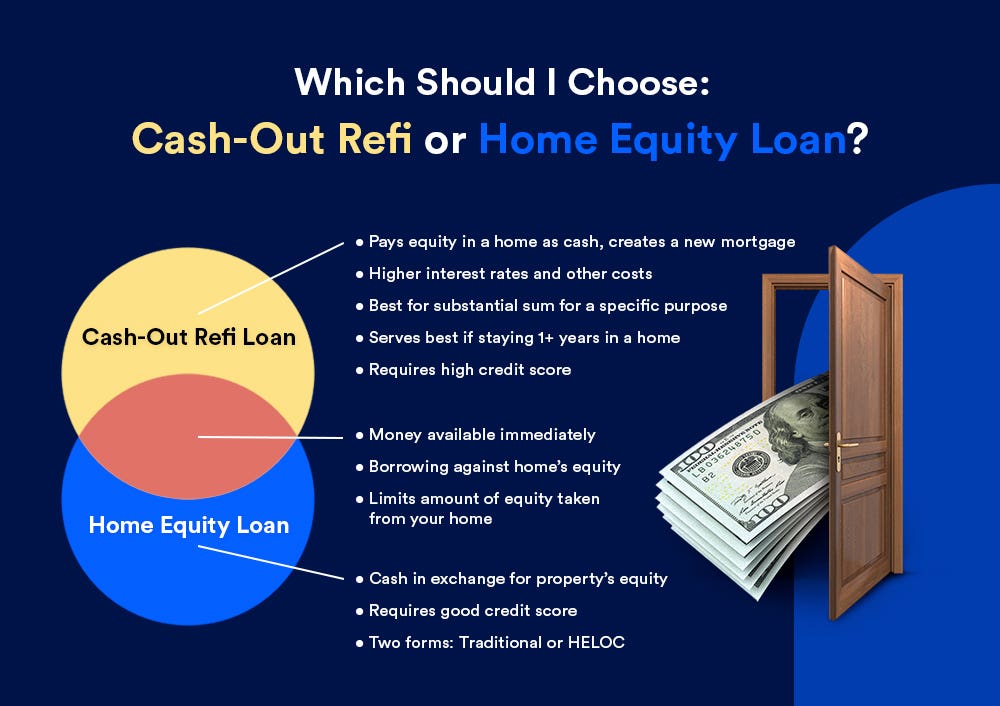Key takeaways
- A cash-out refinance and residential fairness mortgage are each strategic methods to entry the possession stake you’ve got constructed in your house.
- A cash-out refinance is the method of changing your current mortgage with a brand new one, whereas a house fairness mortgage is a second mortgage you’re taking out on prime of your main one.
- A house fairness mortgage works properly when you have a giant possession stake and wish a big, fastened lump sum.
- A cash-out refinance will be the smarter choice in order for you a decrease rate of interest and to cope with only one massive debt.
For those who want cash and have a large quantity of house fairness constructed up, you might need to faucet into that fairness for the funds. Each a cash-out refinance and a house fairness mortgage let you borrow in opposition to your possession stake, utilizing your private home as collateral.
A cash-out refinance is the method of changing your current mortgage with a brand new one, whereas a house fairness mortgage is a second mortgage you’re taking out on prime of your main one.
For those who’re weighing a money out refinance vs. a house fairness mortgage, how do you determine which is the higher choice? Listed below are the advantages and dangers to think about for every.
Money-out refinance vs. house fairness mortgage
Money-out refinance |
Residence fairness mortgage |
|---|---|
| Fastened or adjustable rate of interest | Fastened rate of interest |
| Barely increased rates of interest than conventional mortgages | Larger rates of interest, 2-3% above mortgage charges |
| Should preserve 15% – 20% house fairness | Should preserve 15% – 20% house fairness |
| Curiosity is tax-deductible on unique mortgage principal; cashed-out portion deductible if used on the house | Tax-deductible curiosity, offered funds are used to “purchase, construct, or considerably enhance” the house |
| Longer utility course of | Shorter utility course of |
What’s a cash-out refinance?
A cash-out refinance pays off the remaining steadiness in your first house mortgage and replaces it with a brand new mortgage. The newly refinanced mortgage quantity is for the remaining debt owed on the primary mortgage, plus the quantity you’re “cashing out” — that’s, borrowing — from the fairness. The mortgage time period is mostly as much as 30 years, and the rate of interest — which may be fastened or variable — will replicate prevailing market charges. Money-out refi charges are typically a bit increased than conventional rate-and-term refinance charges.
Some lenders and federal packages could set decrease credit score rating necessities for cash-out refinancing. As a result of the refinancing lender assumes the primary mortgage throughout a cash-out refi, that lender turns into the first lien-holder within the occasion you default. With simpler entry to your private home as collateral, lenders could be prepared to supply decrease charges in comparison with what you’ll get with a house fairness mortgage.
Professionals
Professionals
- Decrease credit score necessities
- One mortgage slightly than a number of loans
- Could increase credit score rating
- Decrease rates of interest than different kinds of debt
- Can be utilized for any goal

Cons
Cons
- Threat of foreclosures
- Lengthy utility course of
- A minimum of 20% house fairness stake required
- Closing prices may be excessive
- Low debt-to-income ratio required
Potential charges related to a cash-out refinance
Closing prices for money out refis sometimes vary from 2 % to six % of the mortgage’s quantity. Money out refis often value lower than main mortgages, as they don’t require sure bills, like title searches and title insurance coverage, which can be frequent when shopping for a house. However you’ll be able to count on to see sure acquainted charges: The lender will doubtless cost you for an appraisal of the property, for instance.
What’s a house fairness mortgage?
A house fairness mortgage has quite a lot of makes use of: a strategy to fund big-ticket purchases, make pricey house upgrades and consolidate high-interest debt.
It’s a second mortgage in opposition to your private home with its personal phrases and rate of interest which can be separate out of your first mortgage. By refinancing utilizing a house fairness mortgage, you’re borrowing in opposition to the house’s fairness — the distinction between the appraised worth of your private home and what you owe in your mortgage. You’ll be able to sometimes borrow as much as 85 % of your private home’s fairness. Nevertheless, your mortgage measurement will depend on different monetary elements, like your revenue and credit score historical past, and the excellent steadiness in your first mortgage.
Residence fairness loans sometimes have a reimbursement interval of as much as 30 years, similar to mortgages. Residence fairness mortgage charges could also be increased than these of refis. The variations, nevertheless, differ considerably from lender to lender and over time.

Professionals
Professionals
- Fastened charges supply certainty
- Decrease charges than unsecured debt
- Lengthy reimbursement phrases/low month-to-month funds
- Curiosity may be tax-deductible
- Use the money for nearly any goal

Cons
Cons
- Foreclosures threat: house is collateral
- Larger credit score necessities
- 15%-20% house fairness required
- Have to be paid off when house is offered
- Straightforward to overborrow attributable to lump sum distribution
Potential charges related to house fairness loans
Residence fairness mortgage charges differ an excellent deal amongst lenders, highlighting the significance of evaluating provides. Whereas some lenders waive origination charges — usually a giant chunk of whole closing prices — they could implement a barely increased rate of interest as compensation. And it’s doubtless that, as with the refi, you’ll should pay for an appraisal and varied administrative charges. Normally, although, house fairness mortgage closing prices are typically decrease than these for a refi, figuring out to 2 % to five % of the mortgage principal. That’s partly as a result of you might incur fewer prices, but additionally since you’re doubtless borrowing a smaller quantity, so percentage-based bills — like origination charges — shall be much less.

When does a cash-out refinance make sense?
Money-out refis typically have decrease rates of interest and are simpler to qualify for, making them interesting for individuals who have less-than-perfect credit score scores. They provide an choice for homebuyers to borrow a lump sum for deliberate bills, with solely a single reimbursement to trace.
Nevertheless, they change your current mortgage with a brand new one, which means a brand new fee time period and rate of interest. You’ll should pay new closing prices, too. For those who obtained an excellent deal in your preliminary mortgage, you may not need to give it up if charges have considerably risen recently. Or, if you happen to’ve had your mortgage a very long time, and your funds are actually primarily going in direction of principal (not curiosity), you may not need to reset the amortization clock with a brand new mortgage.
A cash-out refi additionally tends to make sense if you happen to had been pondering of swapping out your present mortgage anyway — maybe due to a giant drop in rates of interest. Additionally if you will get a greater fee on a brand new mortgage than you have got in your current one or, you need to regulate the reimbursement time period of your mortgage.
When does a house fairness mortgage make sense?
Residence fairness loans allow you to hold your current mortgage and add a brand new mortgage on prime. That may be useful if you happen to obtained an excellent deal in your unique mortgage and need to hold it for so long as attainable. Or simply don’t need to mess with it, on the whole.
A house fairness mortgage is an choice for individuals who’ve paid down an excellent chunk of their mortgage and constructed up loads of fairness of their properties, and who’ve a powerful credit score historical past and rating. The general means of taking out a house fairness mortgage may be easier and faster than a cash-out refinance, too.
In case your financials make sure you’ll get an excellent fee on the mortgage — one which’s aggressive with refi charges — and also you’re capable of finding a lender that waives most closing prices, a house fairness mortgage may very well be the best selection.
Value comparability: 15-year cash-out refi vs. 15-year house fairness mortgage
The desk beneath compares the prices of a cash-out refinance with that of a house fairness mortgage. On this situation, the refi comes out cheaper, regardless of its increased closing prices. It is because the cash-out refinance rate of interest is considerably decrease than the house fairness mortgage fee’s.
15-year cash-out refi |
15-year house fairness mortgage |
|
|---|---|---|
| Mortgage quantity | $150,000 | $150,000 |
| Closing prices | $2,400 | $600 |
| Rate of interest | 5.5% | 7.25% |
| Month-to-month principal and curiosity | $1,225 | $1,369 |
| Whole value in first 24 months | $31,800 | $33,456 |
| Whole value in first 48 months | $61,200 | $66,312 |
| Whole value in first 60 months | $75,900 | $82,740 |
Backside line on cash-out refi vs. house fairness mortgage
If the cash-out refinancing vs. house fairness mortgage contest, keep in mind that each are strategic methods to entry the fairness you’ve constructed in your house. Nevertheless, you need to contemplate your monetary scenario, objectives and the way you propose to make use of the funds to find out one of the best method. It’s equally necessary to think about the qualification standards for each choices to gauge which you’re most definitely to get accredited for.
At all times store round and examine provides from a number of lenders no matter which path you select. Additionally, request an itemized listing of lending charges out of your lender earlier than committing, so you’ll be able to calculate how a lot the mortgage will value.



